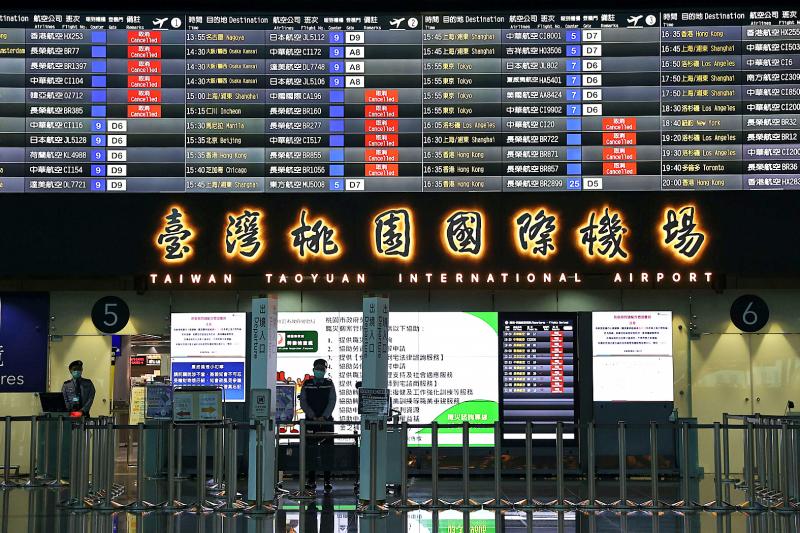Washington rejected Taiwan’s application to join the US border preclearance program because it aims to first prioritize areas with a greater security threat, Minister of Foreign Affairs Joseph Wu (吳釗燮) said yesterday, adding that Taiwan is still pursuing membership.
Taiwan in 2020 applied to set up a US Customs and Border Patrol (CBP) preclearance facility at Taiwan Taoyuan International Airport, meant to expedite travel to the US by allowing passengers to submit to immigration and customs inspections before boarding their flight.
However, the CBP last year rejected the application.

Photo: Ann Wang, Reuters
At a routine hearing of the legislature’s Foreign Affairs and National Defense Committee, Wu denied a legislator’s claim that the application was rejected due to the airport’s relatively small capacity.
The actual reason was because Taiwan does a good job at maintaining security and therefore does not pose a considerable security threat to the US, he said, adding that Washington aims to concentrate on other places first.
One major benefit for the US in setting up preclearance facilities is to catch security threats before they touch down on US soil, rather than turning them away once they have arrived.
However, Taiwan is still seeking acceptance into the program, Wu added.
Apart from the US Department of Homeland Security, which is not discussing the matter at present, other US agencies agree that Taiwan should be included, he said.
In December last year, a group of US senators introduced a bill that would require the CBP to submit a report analyzing the effects of setting up a preclearance facility in Taiwan and other Indo-Pacific nations.
It has not yet been put to a vote.
Meanwhile, Wu denied that Taiwan’s representative to Russia was “rebuked” over something the minister had written on Twitter last month criticizing Moscow’s invasion of Ukraine.
Taiwan People’s Party Legislator Chiu Chen-yuan (邱臣遠) said at the hearing that he had received a tip that Representative to Russia Keng Chung-yung (耿中庸) was summoned to the Russian Ministry of Foreign Affairs and rebuked for something Wu had written on Twitter on Feb. 26, two days after Taipei formally condemned the invasion.
Calling it “Russia’s savage war,” Wu wrote that “Taiwan stays vigilant & knows who to side with. We condemn & sanction the aggressor.”
Wu confirmed that Keng attended a meeting at the ministry, but denied mention of the Twitter post.
The meeting was part of regular interactions between the two sides “to exchange opinions,” he said.
Wu also reiterated that sanctions on Russia would not affect Taiwan any more than other countries, even with its inclusion among 48 countries and territories on Russia’s “unfriendly” list.

DEFENSE: The National Security Bureau promised to expand communication and intelligence cooperation with global partners and enhance its strategic analytical skills China has not only increased military exercises and “gray zone” tactics against Taiwan this year, but also continues to recruit military personnel for espionage, the National Security Bureau (NSB) said yesterday in a report to the Legislative Yuan. The bureau submitted the report ahead of NSB Director-General Tsai Ming-yen’s (蔡明彥) appearance before the Foreign and National Defense Committee today. Last year, the Chinese People’s Liberation Army (PLA) conducted “Joint Sword-2024A and B” military exercises targeting Taiwan and carried out 40 combat readiness patrols, the bureau said. In addition, Chinese military aircraft entered Taiwan’s airspace 3,070 times last year, up about

The Overseas Community Affairs Council (OCAC) yesterday announced a fundraising campaign to support survivors of the magnitude 7.7 earthquake that struck Myanmar on March 28, with two prayer events scheduled in Taipei and Taichung later this week. “While initial rescue operations have concluded [in Myanmar], many survivors are now facing increasingly difficult living conditions,” OCAC Minister Hsu Chia-ching (徐佳青) told a news conference in Taipei. The fundraising campaign, which runs through May 31, is focused on supporting the reconstruction of damaged overseas compatriot schools, assisting students from Myanmar in Taiwan, and providing essential items, such as drinking water, food and medical supplies,

STRICTER ENFORCEMENT: Taipei authorities warned against drunk cycling after a sharp rise in riding under the influence, urging greater public awareness of its illegality Taipei authorities have issued a public warning urging people not to ride bicycles after consuming alcohol, following a sharp rise in riding under the influence (DUI) cases involving bicycles. Five hundred and seven people were charged with DUI last year while riding YouBikes, personal bicycles, or other self-propelled two-wheelers — a fourfold increase from the previous year, data released by the Taipei Police Department’s Traffic Division showed. Of these, 33 cases were considered severe enough to be prosecuted under “offenses against public safety,” the data showed. Under the Road Traffic Management and Penalty Act (道路交通管理處罰條例), bicycles — including YouBikes and other

A magnitude 4.3 earthquake struck eastern Taiwan's Hualien County at 8:31am today, according to the Central Weather Administration (CWA). The epicenter of the temblor was located in Hualien County, about 70.3 kilometers south southwest of Hualien County Hall, at a depth of 23.2km, according to the administration. There were no immediate reports of damage resulting from the quake. The earthquake's intensity, which gauges the actual effect of a temblor, was highest in Taitung County, where it measured 3 on Taiwan's 7-tier intensity scale. The quake also measured an intensity of 2 in Hualien and Nantou counties, the CWA said.